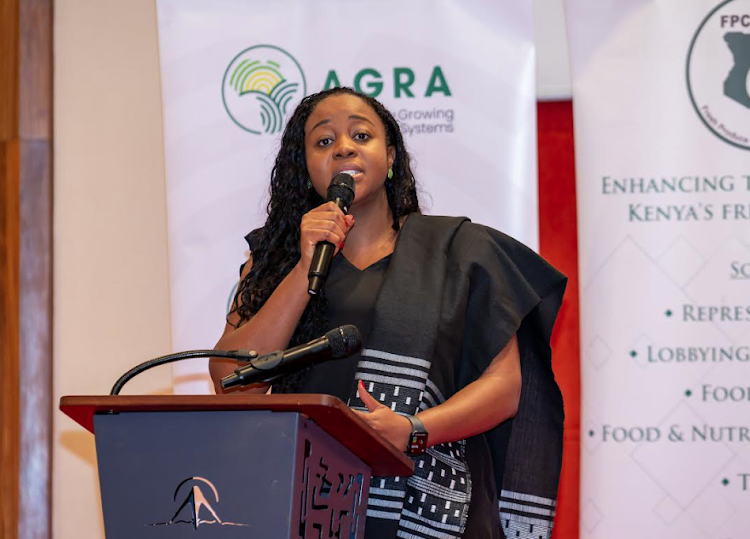This is in addition to policy gaps, poor connective (market reach) and high cost of doing business.

In Summary
•AGRA has partnered with the Fresh Produce Consortium of Kenya (FPCK), to explore opportunities to support women in agribusiness.
•AGRA’s revitalised Gender Inclusive and Youth division is set to empower women through wealth creation, which will be attained through Value4Her platform.
Inadequate information on cross-border trade regulations, capital constraints and market access barriers are limiting the growth of women-led businesses in Kenya and the continent, AGRA now says.
This is in addition to policy gaps, poor market reach and high cost of doing business, which are denying these businesses the ability to tap into the huge potential in the local, regional and African market.
According to the Alliance for Green Revolution in Africa those in agribusiness are among the most hit despite the emerging opportunities under the African Continental Trade Area (AfCFTA), alongside other global export markets.
“While women’s access to financial services is getting better, there is a long way to go. The women rely significantly on their own wages and personal savings, and sources like self-help groups and microfinance institutions, to finance their businesses,” said Nana Amoah, Director Gender Inclusive and Youth at AGRA.
She spoke in Nairobi on during an event, which brought together over 300 women in agribusiness.
Amoah said that facilitating better access to formal finance sources, such as banks, and helping women meet criteria for creditworthiness is important to further grow their businesses.
“However, the women have expressed a low appetite for risk, and their access to and use of risk-management products in agri-businesses is nascent,” she said.
Women make up 80 per cent of agriculture labour force, according to sector data.
Enhancing women’s equitable access to agricultural resources and entrepreneurial benefits lies at the heart of the gender and inclusivity strategy of AGRA, Amoah noted, as the institution moves to partner with the Fresh Produce Consortium of Kenya (FPCK), to explore opportunities to support women in agribusiness.
In a recent study commissioned by AGRA and the Consortium of International Agricultural Research Centers (CGIAR), on gender impact, it revealed that women in food systems could do more than cook meals and yield hoes.
Women can head up businesses, multiply their incomes and make choices for themselves—especially with the help of other women, the report noted.
AGRA Vice President, Programs Delivery Hamadi Boga, said women empowerment programmes require strong inclusive policies and systems.
He added that the newly AGRA’s revitalised Gender Inclusive and Youth division is set to empower women through wealth creation, which will be attained through Value4Her platform.
AGRA Kenya’s strategy aligns with these needs by focusing on supporting women-led agribusinesses, promoting economic empowerment, and driving job creation, he affirmed.
Through strategic program design and delivery, AGRA Kenya emphasizes sustainable farming, inclusive finance, and environmental and social management systems (ESMS) that prioritise women.
Currently, AGRA Kenya is engaged in multiple counties, including Embu, Meru, Laikipia, and Kitui, where 60-70 per cent of the beneficiaries and village-based advisors are women, highlighting a strong commitment to gender inclusion.
Today, women’s participation in agriculture and agribusiness spans various segments, including primary production, aggregation, processing, marketing, retail, export, and value addition, driving innovation, job creation, and making agriculture more attractive.
Despite the progress, barriers to accessing markets and finance remain significant constraints.
Read more –https://www.the-star.co.ke/
